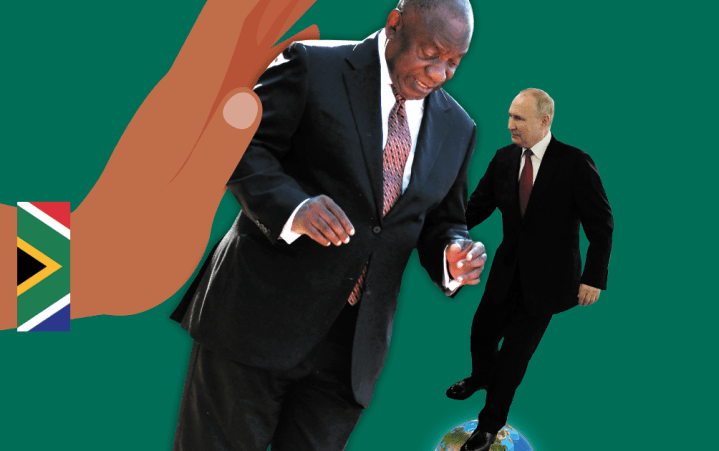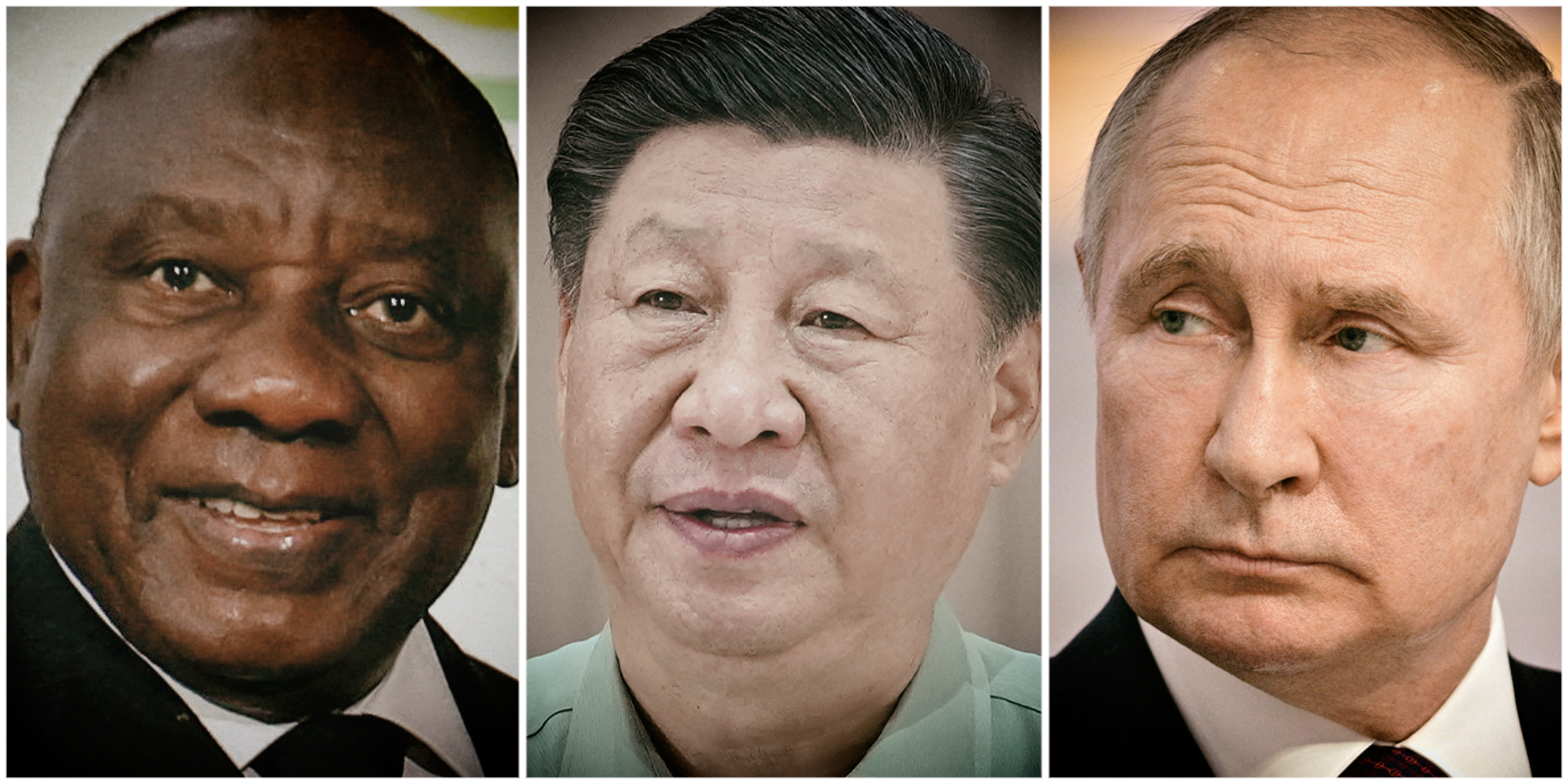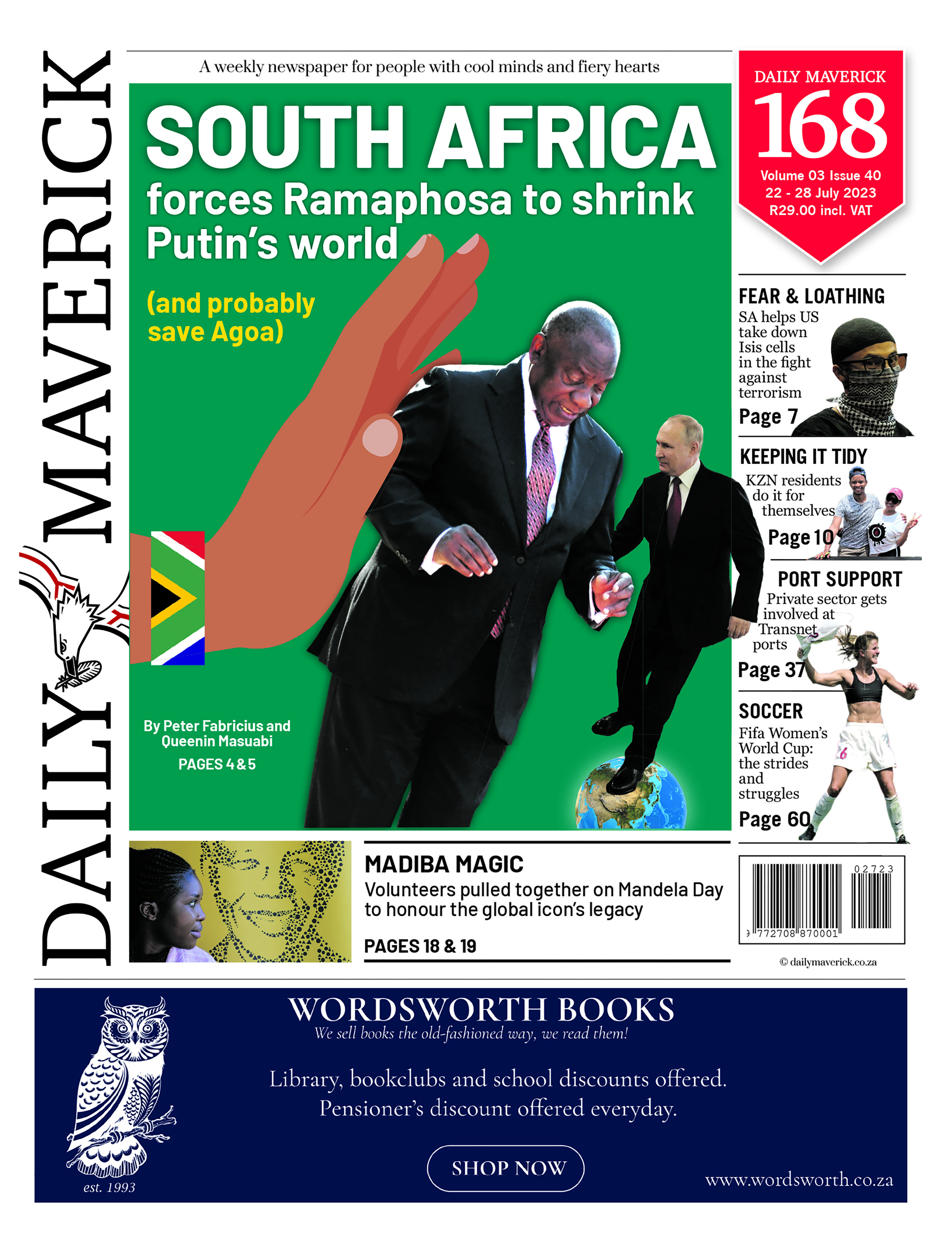INTERNATIONAL RELATIONS
Ramaphosa forced to shrink Putin’s world to manage risk to SA’s global reputation, Agoa trade privileges

US would probably have cancelled duty-free trade privileges if Vladimir Putin decided to attend the BRICS Summit in August and South Africa refused to arrest the Russian leader under an International Criminal Court warrant of arrest issued in March.
President Cyril Ramaphosa shrank Russian President Vladimir Putin’s world this week after considerable pressure. Disinviting him from South Africa was the price for saving South Africa’s reputation and probably also South Africa’s valuable trade privileges with the US.
The reverberations from this important decision, though, are likely to be felt for some time to come.
Ramaphosa insisted that Putin should not visit South Africa for the BRICS Summit from 22 to 24 August and eventually persuaded him to send his foreign minister, Sergey Lavrov, instead – and to take part only virtually himself.
And it emerged in the Gauteng Division of the High Court on Friday, 21 July, that the government had earlier in the week ordered National Director of Public Prosecutions Shamila Batohi to issue a warrant for Putin’s arrest.
Ramaphosa persuaded Putin not to come to South Africa to avoid breaking South Africa’s own law as the International Criminal Court (ICC) had issued a warrant for Putin’s arrest in March, indicting him for the war crime of abducting Ukrainian children and deporting them to Russia.
As an ICC member, South Africa would have been obliged to arrest Putin if he had set foot in the country.
Read more in Daily Maverick: Revealed: Putin agreed in June not to come to summit, but Ramaphosa had to consult BRICS partners before going public
Read more in Daily Maverick: Arresting Putin risks engaging in war with Russia, President Ramaphosa warns on national security
Human Rights Watch welcomed Ramaphosa’s announcement that Putin would not visit with the gleeful headline: “Good news: Putin’s world is shrinking.”
It praised the South African government because, “even if under pressure from the opposition”, it had “put rule of law above global politics”.
Others also lauded Ramaphosa and the government for finally doing the right thing after keeping everyone guessing.
But questions remain about the ANC government’s future commitment to the rule of law. Will it go ahead with its intention to withdraw from the ICC to allow Putin to visit in future?
And will it continue to cosy up to Putin despite signs of his growing bellicosity?
This week, he pulled out of the Black Sea Grain Initiative, which allowed life-saving grain exports from Ukraine’s blockaded ports. South Africa could not bring itself to condemn even that. And Russia bombed the main port of Odesa, apparently to make doubly sure no grain got out.
By whipping the welcome mat out from under Putin’s feet, Ramaphosa probably saved South Africa’s hosting of this year’s forum of the African Growth and Opportunity Act (Agoa), which gives key SA exports duty-free access to the lucrative US market.
US congressional leaders had demanded that the Biden administration shift the summit elsewhere because of South Africa’s warming ties with Russia. That could have been the first step towards cancelling South Africa’s Agoa trade benefits.
The DA hopes that our success in compelling the government to initiate arrest proceedings against Putin will begin to restore our country’s global standing and avert looming economic catastrophes like potential sanctions and South Africa’s ejection from [Agoa].
Ramaphosa had dispatched teams of envoys to the US and other G7 rich countries to persuade them not to punish South Africa for its relations with Russia.
The latest mission was to Washington this month by Trade, Industry and Competition Minister Ebrahim Patel, Finance Minister Enoch Godongwana and Minister in the Presidency Khumbudzo Ntshavheni. Among others, they met the US trade representative Katherine Tai, who administers Agoa.
Daily Maverick believes the envoys to the US were given this blunt message: If Putin comes to South Africa, say goodbye to Agoa.
In the high court on Friday, it emerged that the Director-General of Justice and Constitutional Development, Doc Mashabane, had delivered a letter to Batohi on 17 July asking her to issue a warrant for Putin’s arrest. This was after the ICC had rejected Pretoria’s efforts to obtain a waiver of its obligations to arrest him.
These details emerged in the case where the DA had been seeking a court order compelling the government to declare that it would arrest Putin if he came to South Africa. The government had opposed the DA but, after it emerged that Mashabane had instructed Batohi to issue the warrant, the court said the DA’s case no longer needed to proceed.
The DA said in a statement that Mashabane’s request to Batohi to issue the warrant had come “in direct response to pressure from our court application”.
It went on: “Despite President Cyril Ramaphosa’s best efforts to shield Putin from accountability for his alleged war crimes – including through his absurd claim that the South African Constitution somehow prohibited him from complying with the ICC directive – it is now clear that the DA’s commitment to justice and the rule of law has been completely vindicated.
“The DA hopes that our success in compelling the government to initiate arrest proceedings against Putin will begin to restore our country’s global standing and avert looming economic catastrophes like potential sanctions and South Africa’s ejection from [Agoa].”
Earlier in the high court, confidential testimony by Ramaphosa and Department of International Relations and Cooperation Director-General Zane Dangor had disclosed the intense and uncertain diplomacy that the SA government had undertaken over the past several weeks to avoid Putin visiting.
The government had first proposed to the other BRICS members that the summit should be moved to a BRICS country that was not an ICC member – preferably China. And then it had proposed that all the BRICS leaders should take part virtually.
Eventually, when those proposals were rejected, it was agreed that Lavrov would represent Russia in person and that Putin would participate virtually.
But it appears that, until last-ditch consultations with China and India on the night of 18 July, Pretoria was concerned that they might also send their foreign ministers rather than their leaders if Putin did not attend. That would have collapsed the summit.

South African President Cyril Ramaphosa. (Photo: Ludovic Marin / Pool via Reuters) | Chinese President Xi Jinping. (Photo: EPA-EFE / Xinhua) | Russian President Vladimir Putin. (Photo: (EPA-EFE / Rail Sitdikov / Sputnik / Government Press Service)
So, Ramaphosa and his government eventually emerged from this protracted dilemma with their legal reputations somewhat battered but intact – as they also did by respecting a high court order to extradite former Mozambican finance minister Manuel Chang to the US, not to his home country, to face fraud charges.
How all this affects relations with Russia and the other BRICS countries may emerge more clearly at the BRICS Summit next month. How it will affect relations with the West in the long term is also uncertain.
Russia expert Irina Filatova thinks Agoa will stay in place for now, “though the Americans are unlikely to change their mind about SA’s allegiances”.
She also thinks that, although Putin must have been annoyed to be told he was unwelcome, Chinese President Xi Jinping probably advised him to accept the decision.
“The ‘consultations’ with BRICS partners hint at that. And Putin needs SA. It is his crown jewel in Africa,” she said.
Putin’s efforts to woo Africa will be on display in the coming week when he hosts the second Russia-Africa Summit in St Petersburg. To demonstrate that he is not isolated – including by his disinvitation by Ramaphosa – he will be trying to attract even more leaders than he did to the first summit in Sochi in 2019. Ramaphosa’s office has said he will be at the summit.
“I think there will be a lot of focus on who attends … and last time, in 2019, when the world looked very different before the invasion of Ukraine by Russia, there were 43 African heads of state that went to Sochi,” Steve Gruzd, head of the Africa-Russia project at the South African Institute of International Affairs in Johannesburg, told Voice of America.
An Economic and Humanitarian Forum will run alongside the Russia-Africa Summit with hundreds of participants from African business, politics and civil society, including nearly 40 from South Africa.
In 2019, the forum dealt only with economic issues. A humanitarian dimension has been added this year, possibly to try to soften Russia’s international image.
Meanwhile, at the August BRICS Summit in South Africa, the leaders will discuss the formal applications or declared interest of about 20 other countries in joining BRICS, despite – or perhaps because of – Russia’s war on Ukraine.
Many countries are looking for collective support in a polarising and uncertain world, South Africa’s top BRICS official, or “sherpa”, ambassador at large Anil Sooklal, told Daily Maverick recently.
Western governments and perhaps even some BRICS members fear, however, that BRICS could become a Russia support club.
Sooklal told journalists in the past week that he and the other sherpas had made recommendations on the criteria for admitting new members. These had to be approved by ministers and then by the leaders.
“The question is: Does expansion add value to the organisation or does it devalue the organisation?” Sooklal said.
Daily Maverick had heard that there were different views on that among the five BRICS members, with China and Russia keen to expand the bloc as a counter to the West, whereas India and Brazil were less enthusiastic. But this is not clear.
Satyen Kulabkar of India’s ruling BJP told Daily Maverick at a conference in Johannesburg of BRICS political parties and those from countries interested in joining: “We are already in favour of the expansion of BRICS…
“Once a framework is done, then we will be able to take the matter forward. No one has said no to the idea of bringing in a new member, but how to go about it is still to be decided.”
And Mukul Wasnik, secretary-general of the opposition Indian National Congress, said people generally welcomed the idea of expanding BRICS.
However, it needed an in-depth exercise to establish how it should be done.
It is understood that Department of International Relations and Cooperation Minister Naledi Pandor chaired a virtual meeting on 20 July to consider the sherpas’ recommendations.
With a straight face, the BRICS political parties – which include Putin’s United Russia Party – issued a declaration that included this statement: “We believe that political parties should advocate against interference in the internal affairs of countries, that the sovereignty, territorial integrity and dignity of all nations be respected.”
But where to from here for South Africa? The huge legal reverberations from the Putin saga are not over.
In an affidavit prepared for the DA’s high court case, Amnesty International argued that the offence Putin had been charged with constituted “a grave breach under Article 147 of the Geneva Convention IV”.
And it noted that, just as South Africa had domesticated the Rome Statute that established the ICC into local law, it had also domesticated the Geneva Conventions.
And so, regardless of South Africa’s obligations to the ICC to arrest Putin, it had further obligations under the Geneva Conventions to prosecute him or surrender him to an international court.
It is now unclear whether the ANC will move to withdraw South Africa from the ICC, as it is still contemplating doing, according to legal sources.
There was not enough time to withdraw from the ICC before the BRICS summit.
But does the ANC still plan to withdraw so that it can invite Putin on, say, a future state visit or even to the next BRICS Summit that South Africa is due to host, perhaps in five years?
That is not clear, in part because if the BRICS leaders decide at their summit to admit more members, it may be a long time before South Africa hosts its next summit.
And also because in five years, Putin may no longer be president – and the ANC may no longer be in power. DM
This story first appeared in our weekly Daily Maverick 168 newspaper, which is available countrywide for R29.





















 Become an Insider
Become an Insider
If the BRICS Group had any integrity they would suspend Russia’s membership until they cease their “Special military operation” in Ukraine.
This issue is more about power politics than signatories to international conventions. The significance of Indian prime minister Modi’s recent visit to the US and warm reception is not being given due consideration in this assessment. One wonders if Modi would have attended the BRICS summit if Putin attended – which was unlikely in any event due to Russian domestic issues. Ramaphosa and China had an insignificant influence on the Putin decision to say at home in his castle (so to speak).
Although there is a good argument to be made for a more balanced global economic situation also against the injustice of Dollar and Euro exploitation of emerging markets resources, the military, financial, technological and economic power of the West will continue to dominate the world for some time to come. An adversarial posture by BRICS members, current and future, would be counter-productive. Constructive engagement by able governments is the better option.
The BRICS group should also take a hard look at the impact of the the Middle East petrodollar regimes on the world order, and their role in slavery in the past.
Fundamentally my question is:
What is the point of BRICS and who exactly does it serve?
We are clearly one world and one humanity, and we are all affected by global threats such as climate change and global pandemics.
Surely leaders have the brain capacity to see that there is no longer room for “us and them” approaches and that in driving for these they are literally hastening the destruction of humanity, which obviously includes their own families and their own children and grandchildren.
It is past time for leaders to wake up and realize that what we all teach our children: that EQ and working as a team are the best ways to achieve an optimal outcome applies to them also.
As voters we should all be demanding this – globally.
Well said Ricky Rocker!
Russia spoke of taking harsh retaliatory measures against Ukraine after the two drone attacks, including one close to the defence ministry’s headquarters, in what it called a brazen act of “terror”.
This also absolutely defeats me. Russia attacks Ukraine completely unprovoked, killing indiscriminately… and then cries like a baby when they get the tiniest taste of their own medicine?! Go figure.